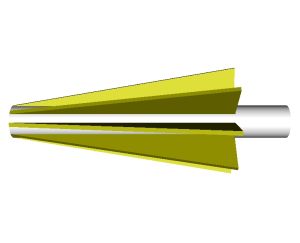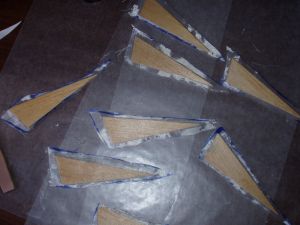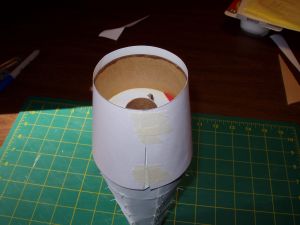Scratch Chicken Hawk Original Design / Scratch Built
Scratch - Chicken Hawk {Scratch}
Contributed by Peter Stanley
| Manufacturer: | Scratch |

Brief:
My entry for the 2009 Design this Spaceship Contest is spaceship #4. I named it the Chicken Hawk because of the
overall shape, and that it could probably kill a chicken if it lawn-darted.
The Chicken Hawk has eight rear fins and 3 forward fins. The forward fins are made of 1/16” basswood. Rear fins are made from 3/32” balsa. It is designed to be flown on a single 24mm motor of D impulse or greater with at least 12 newtons of average thrust.
Construction:
I derived the scale conversion data by overlaying the image on a grid in Photoshop and converting grid 'units' to
actual measurements. My reference for actual was the base of the tail cone, which was going to be 2.6” in
diameter. I divided the actual by the measured grid units to get the scale factor. I then multiplied the scale factor
by all the other grid units for the actual measurements of everything else. I used Google's Spreadsheet application to
calculate the actuals, but any spreadsheet software would work. I think my scale factoring method worked fairly well,
except I was a little wide with my fin span. I should have double checked but didn't realize it until I had most of it
built. The wider fin span may have helped bring the CP back anyway. This shape needs all it can get.
The following components were used:
- 1/16” basswood
- 3/32” balsa
- Several sheets of cardstock paper
- Standard printer paper
- ½ inch pieces of 0.025" music wire x 32
- Base of another 24mm nose cone
- Lead shot
- Yellow glue
- BT-50 tubing, 8.25"
- BT-80 tubing, 2.5"
- ¼" elastic, 3 feet
- 12" nylon chute
- Model magic clay
- BT-5 tubing, 1.45" x 4, cut in half lengthwise
- Priority mail cardboard
- Engine hook
- Engine block
- 1oz fiberglass cloth
- Epoxy, finishing, 30 minute, and 5 minute
The following tools were used:
- VCP software
- RockSim 9
- Hobby knife
- Bondo spreader
- Disposable paint brushes
- Ruler
- Aluminum angle
The Chicken Hawk was constructed using a length of BT-50 tubing that extends from the bottom of the motor mount to the base of the nose cone. Attached to the extended motor mount tube are internal fins which are covered with cardstock paper. Pieces of music wire were inserted in the internal fins leading edge and connected through the paper skin to the external fins. I could not model the entire assembly in RockSim. I created a separate RockSim file for the internal fin assembly.




The nosecone was made with cardstock paper shaped into a cone and glued onto the base of a 24mm nose cone. The old nose cone was scavenged from another rocket. The shape for the nose cone was generated from a free online tool used for making transitions. Although there are many tools available for making transitions/cones, I enjoy using this one. The paper was coated with CA glue and filled with lead to increase strength and move the center of gravity forward.
I started with the internal rib assembly by printing my internal fin template and tracing onto some 3/32” balsa sheet. I cut these out, stacked together and sanded each side to make them all even. The forward ends of the fins will align with the end of the tube. I used a fin wrapper created from VCP and aluminum angle to make eight lines for fin placement. At this point I did not glue them on yet.
I performed the same steps as above to create the external fins. I set aside internal/external pairs and numbered them. I measured four one-inch marks on the internal fins (leading edge) and pressed the ½" pieces of music wire into those points using pliers. I used a shim to keep them centered. I glued the music wire into the internal fins. After the glue dried, I pressed the external fins (root edge) against them to make the alignment holes along the root edge. This was done to make the final assembly easier and more accurate.






I glued the internal fins to the motor mount tube. One thing I should have done but didn't was make an alignment guide for eight internal fins. I eyeballed it and later discovered some of them weren't perfectly straight. An alignment guide can be easily created using VCP and cut out onto card stock paper (or your alignment guide material of choice). I did create one for the external fins.
I mounted the engine hook so that ¼” inch was exposed below the motor mount tube. I cut a slit for the forward end and glued in place. I wrapped masking tape around the center of the engine hook.
I glued an 8" piece of 1/8" launch lug material along one of the fins against the body tube starting at the top of the body tube. Any kind of small diameter tubing would probably work OK. I happened to have some long 1/8" tubes available.
This next part is not shown in the rib assembly RockSim file. After gluing the rib fins on I decided to add braces which would add strength as well as help form the paper skin's cone shape. I created the pattern for these manually using the fin alignment guide printed from VCP. I used a compass to draw lines at 3/16" apart from each other with the center point the center of the alignment guide. I cut 32 of these from balsa and glued 4 each between the internal fins at the once inch marks.
I created a centering ring template for the transition between the forward cone and tail cone. I cut out the template and attached to Priority Mail cardboard using spray adhesive and cut out with a hobby knife. I made two more of these designed to fit between the motor tube and inside of the BT-80 exhaust tube.
I glued the exhaust assembly to the motor mount tube so that it was butted against the transition ring.I created a shroud template for the tail cone transition. I made it oversize and trimmed the excess after the glue was dry.



My original plan was to create one big shroud and wrap around for the outer skin. The extruding pins made this impossible. I did print out the shroud template onto cardstock paper and cut slices for panels, covering each section between fins. The look was not as good as I hoped, but the results were acceptable.
Before attaching the external fins, I fiberglassed them with 1.5oz cloth and finishing epoxy. I attached the external fins to the forward cone body using the music wire pins and yellow glue. I applied fillets of yellow glue and after that was dry, painted 30 minute epoxy in the joints.
I attached the nose fins to a piece of 1/8" dowel with the help a handmade alignment template, again generated from VCP.
I cut slots in the nose shroud and trimmed the 1/8" dowel so that the assembly would slide in with the end of the dowel at the tip of the nose cone and the bottom of the fins at the base of the cone. I epoxied the dowel into the tip and glued the fins in the cut-out slots.


 The faux-pods were created using 1.45" half-pieces of BT-5 tubing. I made eight of
these and then added some model magic clay on each end.
The faux-pods were created using 1.45" half-pieces of BT-5 tubing. I made eight of
these and then added some model magic clay on each end.
I added as much nose weight as possible using lead shot and epoxy. I ended up using 2.7oz of weight. After nose weight was added, the rocket was still only marginally stable.
The tail cone strips were made from 3/32" x 3/32" strips cut to 1.5" lengths. I cut eight of these and rounded all of the edges. They were glued about ½" below the top of the tail cone underneath each fin.


Documents and templates available for download:
- Body cone template (PDF)
- Bottom shroud template (PDF)
- Conversion data chart (PDF)
- Fin Wrapper (PDF)
- Forward fin template (PDF)
- Internal rib template (PDF)
- MMT template (PDF)
- Nosecone-fin alignment tool (PDF)
- Nosecone shroud template (PDF)
- Aft fins template (PDF)
- Transition template (PDF)
- Wedge template (PDF)
Finishing:
I started finishing using two coats of white Krylon primer, lightly sanding between coats. I then applied two coats
of Krylon Pebble, which is a light gray/beige. I made my own waterslide decals using some decal paper I found on eBay.
I created the images in Photoshop (I borrowed the NASA logo) and printed onto the decal paper. Per decal paper
instructions, I coated the sheet with Krylon Crystal Clear Acrylic spray after printing. My luck with actually using
these varied. It was difficult to get them on without smearing the ink. After all the painting and decal work I sprayed
a couple coats of Krylon clear coat, same as what was used on the decal paper.


Decal images available for download:
- Chicken Hawk text decal (GIF)
- NASA logo decal (GIF)
- Stripe decal (GIF)
- Decal sheet (Microsoft Publisher)
Flight and Recovery:
The first flight was on a D12-3 motor with a 12 inch chute. The boost was straight, but just before apogee it looked
kind of weird, sort of rotating in place. I didn't capture that part on video, as I had lost it for a second. It came
in a little hot, landing maybe 40 feet from the launch pad. One of the fins broke at the root joint but was easily
fixed. The tip of another fin was crushed a little too. This type of damage can be mitigated with a bigger chute, but I
don't think one will fit in the body tube. Click here to see video
of flight #1 on YouTube.
Flight two was disastrous. Unfortunately we forgot the video camera. This flight also powered by a D12-3 motor. It went up a few feet, arched over and snaked/oscillated up and down in a horizontal direction toward a group of trees. The trees were surrounded by a 5 foot tall thicket of briers and standing water. Just as it went into the bushes, I saw a puff of smoke, the chute, and it disappeared in the briers.


Summary:
My biggest challenge with this design was finding the balance between stability and strength. I think I overbuilt it,
and the extra body weight made it hard to bring the CG forward as much as necessary. If I were to do it over, I would
have focused more on stability and erred on the side of flimsiness.
Sponsored Ads
 |
 |











